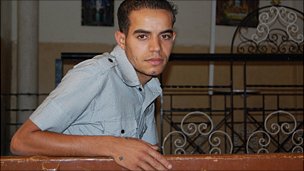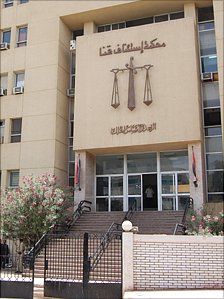هيئة الإذاعة البريطانية BBC تنشر تقريراً عن شهداء نجح حمادى بعنوان .. رصاصات نجع حمادى تركت ندوباً طائفية ..
جورنال
Egypt's Naga Hamady shooting leaves sectarian scars
By Yolande Knell BBC News, Cairo
Poster showing six Christians killed Posters in a Naga Hamady church show the six dead Christian "martyrs."
The main street in Naga Hamady is bustling with shoppers much as it was on Coptic Christmas Eve after worshippers left a nearby church.
However, that night a drive-by shooting took place that shook the community.
Seven people died, six Christians and one Muslim security guard. It was Egypt's worst sectarian attack in a decade.
Even today, tensions remain high in the town, 70km (40 miles) from Luxor in southern Egypt, but one survivor of the attack agrees to meet in a local chapel.
"On the day of the incident, a big group of us were standing near the square in the town-centre," recalls Antonious Reza, as he perches nervously on the edge of a pew.
"Five minutes before the firing started, I had a phone call and so I walked away to talk. Then I watched the car stop and I was face-to-face with the gunman as he opened fire."
The university student saw two of his companions killed and three injured.
Shooting witness, Antonious Reza Antonious Reza survived the Christmas Eve attack but saw a gunman kill two of his friends.
"There was total confusion," he says. "People in the street ran in all directions, including towards the gunfire. He was shooting randomly. He could have killed many more."
History of clashes
About 10% of Egypt's 80-million population is Coptic Christian but Naga Hamady is unusual for having a Christian majority.
The shooting was not the first sectarian violence in the area. Officials believe it was revenge for the earlier alleged rape of a Muslim girl by a Christian man in November 2009 that led to attacks on Christian property.
After the deaths in Naga Hamady, false rumours spread that Copts had killed a Muslim and set fire to a mosque. Again, mobs went on the rampage.
"The Muslims in my village, they opened my shop and took everything inside: my computer, my mobiles, just because I am Christian," the owner of a mobile phone store, Shenouda Abadeer, tells me. "The police did not do anything. I lost everything."
Continue reading the main story
“Start Quote
In 99% of cases, the perpetrators are not brought to justice. The result, of course ,is a pattern of impunity and that is absolutely a recipe for the recurrence of this violence.”
End Quote Hossam Bahgat Director,
No compensation was given for the robbery.
In nearby Qena, three Muslim men are on trial accused of carrying out the murders in Naga Hamady. The alleged rape case is being heard in the same courtroom.
However, human rights groups in Egypt say many crimes of a sectarian nature never reach court.
The Egyptian Initiative for Personal Rights (EIPR) investigated over 50 cases in the two years leading to the shooting.
"We have been documenting an increase in the frequency of these incidents at the rate of maybe two a month. They take place in the north and south, in urban centres as well as villages," says EIPR director, Hossam Bahgat.
"What all have in common is a continuing failure of the state's authorities, particularly security agencies, to respond adequately."
"In 99% of cases, the perpetrators are not brought to justice. The result, of course, is a pattern of impunity and that is absolutely a recipe for the recurrence of this violence."
Qena Courthouse The Naga Hamady murder trial continues in the court at Qena
Calling for unity
Recently the president and religious leaders have called for social unity in Egypt. There are also efforts to promote citizenship - encouraging people to identify themselves primarily as Egyptians rather than by their faith.
However, many experts believe much can be done to promote religious tolerance and understanding.
"What happened in Naga Hamady is called ignorance," says the President of the Interfaith Committee of the High Islamic Council, Ali al-Samman.
"If you look at it long-term, it needs a lot to be done with a lot of institutions. It can start with the family, it goes to school, to television to find a way that the culture becomes the culture of everybody."
Opposition activists suggest that ending the state of political stagnation in Egypt will also have an effect.
They say in the past 30 years, Egyptians have built their social lives around mosques and churches in the absence of other civic spaces.
Fears for future
In Naga Hamady, I meet some Muslims desperate to put the January shooting behind them.
"The attack was an individual act. It was not an attack by Muslims against Christians in general. It does not reflect any kind of hostility," insists Abdel Fattah Mohamed Abdel Al.
Bishop Anba Kirollis of Naga Hamady Bishop Anba Kirollis accuses security services of mishandling sectarian tensions in Naga Hamady
The local bishop Anba Kirollis also stresses he has worked with local Muslim leaders to help restore calm. He says it is the security services which must change their response to religious troubles.
"Things are still being dealt with in a biased way. Handling issues related to relations between Copts and Muslims is not equal," he says.
Now many locals in Naga Hamady fear that political campaigning ahead of parliamentary elections next month and the ongoing trials could lead the situation to unravel again.
Some in Egypt warn that an even worse crime could take place, with even more victims, unless sectarian strife is dealt with urgently.
Court postpones trial of Naga Hammadi murder suspects
Hindawi Mohamed Sayyid Hassan, a suspect in the 6 January Naga Hammadi shooting, standing in the dock during the first hearing at the Supreme State Security Court.
An Egyptian court on Sunday postponed the trial of three Muslims accused of killing six Christians and another Muslim on the eve of Coptic Christmas in early January in the city of Naga Hammadi, some 600 kilometers south of Cairo.
Judicial sources said the trial was postponed until 19 October due to the absence of certain witnesses. They also said the court had fined Coptic Bishop Korollos LE200 for not attending an initial hearing even though he had received a subpoena.
Korollos accuses one of the defendants in the case of planning and carrying out the attack. He has also sharply criticized the security services for failing to protect church congregants.
The defense team, meanwhile, considers the trial unconstitutional, since it is being held in an emergency court.
The trial has sparked considerable controversy, since it represents the first time in decades for defendants in a sectarian case to be referred to the Supreme State Security Court, the verdicts of which can only be appealed by the president of the republic.
The defendants have been charged with using force to disrupt public order and intimidate the citizenry.
Prosecutors, for their part, say the defendants deserve the death penalty.
Both the United States and the European Union, meanwhile, have expressed concern over perceived sectarian tension in Egypt, calling on the Egyptian government to take adequate measures to combat the trend.
It is believed that Coptic Christians account for between 7 and 9 percent of Egypt's 80-million-strong population
Encyclopedia - أنسكلوبيديا